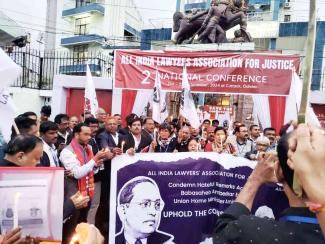
The All India Lawyers Association for Justice (AILAJ) successfully completed its 2nd National Conference in Cuttack, Orissa on 21-22 December. Over 150 delegates across 16 states were in attendance. The 1st National Conference of AILAJ was held in Bangalore, Karnataka in May, 2022.
The National Conference opened with a public lecture on the critical topic of ‘Independence of Judiciary’. Retired Supreme Court Justice A.K Patnaik graced the occasion as the Chief Guest, and Retired Madras High Court Judge, Justice K Chandru, as the Guest Speaker. Maitreyi Krishnan, the President of AILAJ in her introductory comments stressed the importance of an independent judiciary for a thriving democracy and emphasised that judicial accountability and independence must comprise all three facets of the judiciary, namely administrative, behavioural and decisional accountability. She also decried in strong terms the increasing executive excesses, and its adverse impact on judicial independence.
Retd. Justice AK Patnaik, Chief Guest began his remarks by commending AILAJ for grounding its organisational objectives in serving the people and promoting the values of the Constitution. On the topic of judicial independence, he recalled the judgement of the Supreme Court which introduced the collegium system to protect the judiciary’s independence and the larger context of judgment, which was passed against the backdrop of the emergency when the judiciary had abdicated its moral responsibility. He stressed that lawyers must be the protectors of democracy and act as the foot soldiers of the Constitution by spreading its values among common people. He also critiqued the political class for being narrowly concerned with aggrandising power, and not with people’s issues, and in this regard stressed the importance therefore of lawyers in holding them to account. Importantly, he remarked that democracy is not just about voting once in five years, but in demanding and enforcing daily accountability from the State. He concluded by encouraging the assembled lawyers to band together to uphold democracy, protect the constitution and defend the rule of law.
Retd Justice Chandru, the Chief Speaker began his speech by reciting the slogan Jai Bhim, and criticised the recent comments of Home Minister Amit Shah on Dr Ambedkar. He commented about the recently concluded national elections in the country and how BJP’s reduced share count is an expression of people reclaiming the Constitution. He cited the example of the Waqf Bill, and how the government was unable to pass it in Parliament because of the BJP’s reduced vote claim. However, he stressed that the Constitution must not be treated as a holy document or scripture but one that must be in service of people’s power. He remarked that for our judiciary to be truly independent, judges must show fidelity to the Constitution in their judgment and conduct, given that they take oath under the Constitution. He shared that unfortunately judiciary has time and again failed to do so, giving the example of a Madras High Court judge who was appointed as the High Court judge despite opposition of several lawyers against her hateful vitriol against minority communities as well as the example of an Allahabad judge who recently stated that the country is run by the majority. Both these cases betray the judiciary’s insolence with respect to the Constitution. On the collegium system, he questioned its capacity in being independent, just and transparent, and cited the recent example of Saurabh Kripal being snubbed from Supreme court judgeship for his sexual preferences as an illustration of the collegium’s biases. He added that the collegium is compromised and is mostly concerned with executing instructions from certain political headquarters in Nagpur by appointing politically biased judges. He also raised the issue of pendency of cases and its implications for justice, referring to the pending Sabrirmala review case which is yet to be taken up by the Court. Despite the Supreme Court having stated that preventing women from entering the Sabrimala temple is akin to untouchability under Article 17, women as of now, are still prohibited from entering the temple due to the judgment pending before the Supreme Court. He also spoke about the unconstitutionality of state actions including the State hounding young muslim girls from wearing their hijab in education institutions and a recent incident in the Karnataka High Court where a judge found no issues with provocateurs shouting Jai Shri Ram at a mosque. He concluded his speech by stating that we must not treat the Constitution as the exclusive subject of lawyers, but as the subject of the people, and exhort common people to fight for its survival. He emphasised that if we as a community stand vigilant, judges cannot fail us.
The first day of the National Conference ended with AILAJ holding a candlelight vigil in protest of Home Minister Amit Shah’s recent unsavoury comments on Dr Ambedkar in the Parliament, and added their voice to a chorus of social movements and groups seeking his resignation.
AILAJ over the course of its two day conference reviewed the activities and campaigns it undertook in the past two years, and drew up a plan for future activities. Critical resolutions on AILAJ’s position on various topical issues were also passed. Among the highlights was AILAJ’s renewed commitment to pushing the government to pass an Advocate Protections Act in light of the recent spike in violence against advocates, secure social security benefits including stipends for junior lawyers, medical insurance of lawyers and other holistic social security benefits for clerk and in opposing unconstitutional laws including labour codes and other communally laced laws. The conference concluded by electing a 43 member National Committee. Advocate Maitreyi Krishnan was unanimously chosen to continue as the National President. AILAJ reaffirmed its commitment to be the voice of all sections of the legal fraternity, stand by the common people in their struggle for a life with dignity and freedom of expression and to protect the Constitution.

Charu Bhawan, U-90, Shakarpur, Delhi 110092
Phone: +91-11-42785864 | Fax:+91-11-42785864 | +91 9717274961
E-mail: info@cpiml.org







